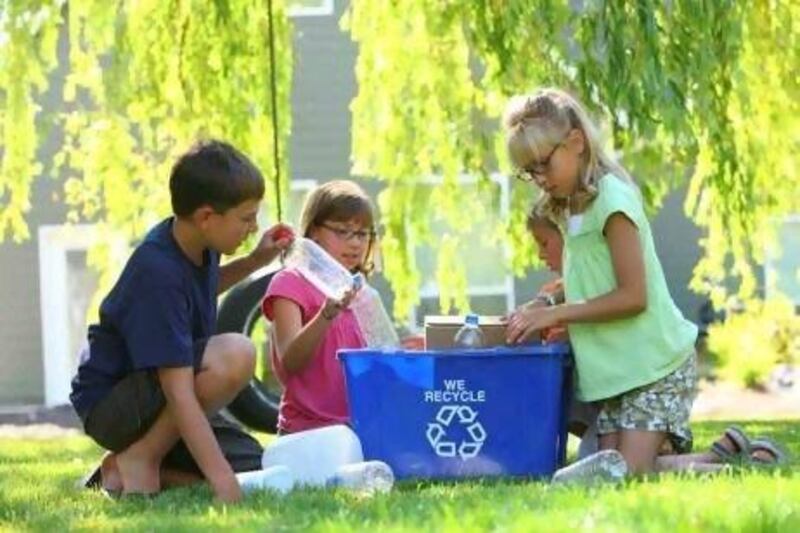Schoolchildren in Abu Dhabi have been able to minimise the use of two tonnes of disposable plastic bags by speaking to customers at LuLu supermarkets about the negative environmental effect of using such bags.
It's the kind of thing that makes parents puff up with pride. After all, who wouldn't want their child to grow up with such a caring attitude towards the environment?
If you want to raise a child who will look after our planet, here's an eight-step guide to equipping your offspring with the know-how to make a difference.
Grab their attention
Children are the future consumers, educators and leaders of the world and they will determine whether people live sustainably. Tap into Be'ati Watani (www.beatiwatani.com) - My Environment, My Country - an English and Arabic educational website that engages children's interest in different environmental challenges, ranging from wildlife protection issues to tackling global climate change, via games and interactive characters.
"Environmental education helps give students and their families a stake in encouraging and protecting our natural heritage and provides the tools needed to help build a sustainable future," explains Ebrahim Ahmad Al Ansari, the general manager of Dolphin Energy UAE, which sponsors Be'tai Watani. Also, try the games at www.ead.ae/shaheensworld/en where the 16-year-old character Shaheen, from Abu Dhabi, teaches children how to protect the environment.
Make recycling fun
Put together an art display using natural finds such as fallen leaves and twigs, pressed flowers, pebbles and shells, or try creating "junk sculptures" - models made of rubbish that would otherwise have been thrown away. At the weekend get the kids together and decorate some recycling bins with funky designs to remind the family to recycle everything possible, including aluminium, paper, plastic and batteries. Turn the sorting into a race and let the children compete.
Ban all drips
If you have a dripping tap in the house,make sure your child notices you are making an effort to fix it, and why. If you stop a tap from leaking one drop each second, you can save 2,700 gallons of water a year. This is particularly important because the UAE has one of the highest ecological footprints in the world, with 60 per cent of energy and water consumed by the country's domestic households. And don't forget to turn off the tap when you're brushing your teeth.
Spend wisely
Green spending habits can be taught early. Let your children know that banks invest your money rather than save it, and that they can put your money into causes that harm the planet. Take time to explain how spending can be a force for good, and that by avoiding the supermarkets and embracing local businesses, they can help the local community.
Get on your bike
Be proactive and show your child that there are greener ways to get around. If possible, use public transport such as the bus or metro and explain to your children that it's much better for the environment if everyone travels together. If you do take the car, try to share lifts with other people to conserve energy and reduce carbon emissions. Better still, get family members out on their bikes to enjoy the fresh air.
Grow your own
Grow some organic vegetables at home where your kids can help plant, water and care for the garden, watch the plants grow and enjoy the results at dinner time. If you haven't got a garden, encourage your children to ask if they can start an organic garden at school. They could even bring in kitchen and garden waste from home to create a compost heap that could be used to fertilise the ground.
Switch off
Turn off lights and appliances when not in use. Children who aren't environmentally conscious don't normally think about doing this because kids don't tend to be cost conscious, which means they are wasteful. Children who reduce, reuse and recycle know that wastefulness is not good, and one thing they should not waste is energy.
Adjust the AC
If your children are old enough, show them how the air-conditioning control works and explain that, according to Dewa, if every customer turned up the temperature by just two degrees, to a comfortable 24C during peak hours, it would save enough energy to supply 11,000 apartments with energy for a whole year. Put your child in charge of keeping windows closed to stop cool air escaping, and make it their job to turn the AC off when you leave the house (although it's best to check that they've actually done it).
Eco facts
6 weeks is the amount of time it takes for an aluminium can to be recycled and ready to use
90 million tonnes of wood can be saved if we all recycle our share of paper
60 per cent, on average, of the rubbish that ends up in the dustbin can be recycled
3 hours of the electricity it takes to run a TV set can be saved by recycling one aluminium can
400 years is the amount of time it can take for a non-biodegradable plastic bag to break down
70 per cent less energy is required to recycle paper compared with making it from raw materials
40 centuries is the amount of time a glass bottle can take to break down if it's not recycled
1 recycled glass bottle can save enough energy to power a computer for 25 minutes
16 per cent, on average, of the money you spend on a product pays for the packaging, which ultimately ends up as rubbish





